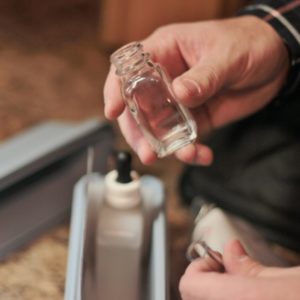-Our testing is not exhaustive and does not cover heavy metals, specific minerals, pesticides, or organic chemicals.
-The EPA recommends the testing of well water at least once per year.

The water quality analysis that we perform is a reliable method of determining the safety of well water. This analysis will also give the homeowner a picture of the general quality of the water they are drinking.
Our testing includes the following:
- Bacteriological
- pH
- Temperature
- Hardness
Bacteriological
This test is a presence/absence test for Coliform bacteria. Coliform is an indicator bacteria, which means that if it is present in drinking water then that could indicate that other disease causing organisms are also present. If the presence of Coliform is detected, then the sample is analyzed to determine if E. Coli is present as well. This test is the standard by which public utilities determine the safety of drinking water. If the presence of Coliform is not detected, then the sample is considered to be free of pathogenic organisms and safe to drink.
- Requires 18-24 hours to determine results
- Requires the use of a laboratory certified by the State of Tennessee
pH
This is the measure of hydrogen ion concentration in your water. The range goes from 0-14 with 7 being neutral. Water with a low pH (below 7) is acidic and if the pH is high (above 7), then it means the water is basic. So, what does that mean?
- Acidic water – Can leach metals from pipes and fixtures such as copper, lead, and zinc (think Flint, MI). Also, causes aesthetic issues like staining laundry and fixtures, and can produce a metallic or bitter taste.
- Basic water – Can cause scale build-up in pipes, reduced efficiency of water heaters and can produce an alkali taste that causes coffee to taste bitter.
Temperature
This simple test may seem insignificant but the temperature of water is important in determining its quality. Temperature affects every reaction that takes place in water, so establishing a pattern as to what is normal is necessary.
Hardness
Hardness in water is caused by calcium and magnesium ions. Well water, especially in East Tennessee, is typically considered hard to very hard on a scale ranging from soft – moderately hard- hard- very hard. Knowing the hardness of your water is crucial in understanding your home and how hard water affects it.
The disadvantages of hard water are:
- Scale build-up on water heaters and boilers
- Reduced lathering of soaps
- Accumulation of whitish-gray scale on showers and tea kettles
- Staining on washed clothes
- Reduced flow in hot water distribution pipes due to scale build-up
It is the homeowner’s responsibility to determine the safety of their water for all of those that may drink it.
Find peace of mind about the quality of your water, Contact Me now to schedule your Water Quality Analysis.

